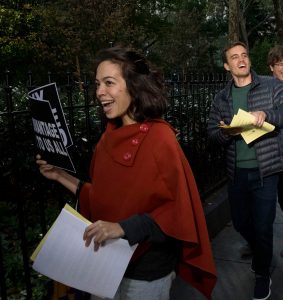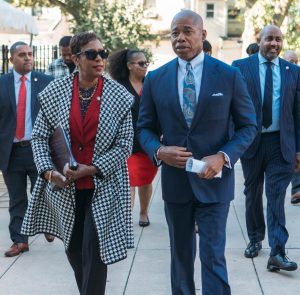
Renee Bell, an assistant professor of mathematics at Lehman College, is one of many active PSC members who are in solidarity with retirees. (Credit: Dave Sanders)
One of the many reasons Renee Bell chose a career at CUNY was the “guarantee of a dignified retirement.”
In an interview with Clarion, Bell, an assistant professor of mathematics at Lehman College, said, “We are all future retirees! Retirees are being targeted because the City views them as being vulnerable. We have to be in solidarity with them.”
As Clarion reported in October 2022, “The Municipal Labor Committee (MLC) approved a plan to join Mayor Eric Adams administration in calling on the City Council to change city law to remove the floor on city contributions to the cost of health insurance for city employees, retirees and their dependents.” This approval followed a court decision that blocked an earlier attempt to partially privatize municipal retiree health coverage by charging retirees $191 a month to stay in traditional Medicare. City Hall has, according to municipal labor leaders, stalled contract talks with unions on grounds that the health-care costs must be achieved before bargaining can go forward.
Since then, thanks to the activism of PSC members and thousands of retirees and their allies citywide, no council member has been willing to sponsor the proposed change in the law, and no council committee chair has scheduled hearings on it. PSC members have sent more than 5,000 letters to council members and have met with virtually all the key council members about this issue.
CITY ULTIMATUM
In response, City Labor Relations Commissioner Renee Campion issued an ultimatum. She informed MLC Chair Harry Nespoli in an October 28 letter that, if the Council didn’t come up with a “swift timeline” to change the administrative code by November 4, the City would ask Arbitrator Martin Scheinman to “order immediate implementation of a Medicare Advantage (MA) plan with the elimination of all other plans that otherwise would have been offered to retirees.”
As Politico reported, the “Office of Labor Relations said it will have to enroll retired city workers in the Medicare Advantage health plan and get rid of other plan options if the City Council does not change the administrative code to make way for the privatized plan,” because, as Campion said in her letter, “The City continues to lose $50 million a month for every month this plan is delayed, putting our shared goals in significant jeopardy…. We must move forward with the MAP plan in any way that we can, as quickly as we can.”
Legal experts advised that there are serious questions about the legality of the City’s threatened move, and retirees and their supporters redoubled their activism in response to the threat. At press time, Arbitrator Scheinman had not issued the threatened decision.
The Daily News reported that the MLC and mayoral “request is gaining little traction in the Council,” quoting an anonymous source saying that the response from the City Council was “lukewarm at best.” It remains to be seen whether City Council Speaker Adrienne Adams will garner the votes necessary to make the mayor’s plan a reality.

Mayor Eric Adams, right, has pressured City Council to act. How will City Council
Speaker Adrienne Adams, left, respond? (Credit: Emily Cohen/NYC Council Media Unit)
While the PSC is one of several MLC member unions that opposed the plan to amend the administrative code, pressure on the municipal unions to bend to City Hall on this issue has been intense. The proposed legislation has the backing of the Daily News editorial board, which said that the proposal’s detractors “should be aware that the new initiative is expected to save the city $600 million a year, set to be reinvested into a fund that supplements care for retirees.” And by all accounts, Mayor Adams has told the major municipal unions that City Hall will negotiate union contracts for municipal workers only after an agreement on reducing municipal worker health-care costs is achieved.
DELAYED BARGAINING
“The City made one thing clear: in order to get the raise we deserve, we must resolve the issue of health care,” District Council 37 Executive Director Henry Garrido said in a message to his members. “Without a long-term solution to control inflated hospital charges and other increasing health-care costs, the City of New York will be forced to charge workers for health insurance, a benefit we have been able to protect and provide at no cost for active members, retirees and our dependents for decades. That means any pay increase we secure will be completely absorbed by your out-of-pocket expenses for health care.”
In a November 7 letter to members, PSC President James Davis reflected on these concerns:
“While we organize against these harmful, anti-worker plans of the Adams administration, we realize it is not enough just to say, ‘No’. We have advocated that the City work with the MLC on other ways to contain the skyrocketing cost of health care, including self-insurance, collective drug purchasing, dealing aggressively with exorbitant hospital charges and issuing a formal request for proposals for a comprehensive benefits plan so the City’s current provider is incentivized to do better. We believe in the long run a single-payer health insurance program is necessary, but we also recognize the urgency of the moment and believe that the City must not place the burden of saving $600 million annually on the backs of municipal retirees and their dependents by forcing them into a Medicare Advantage plan or into premiums for opting out. We have advocated for an alternate source of funding from the City’s current reserves and are pressing for this alternative approach with council members and the MLC leadership.”
Several former municipal deputy commission
ers signed a joint letter to city lawmakers, urging them to vote against any change to the law. “This action is being taken without any involvement of about 250,000 retirees who are not represented by any union,” the letter stated. “Many retirees, including the undersigned, entered city service understanding there would be stability in advanced years while opting for lower salaries and intense commitment of time and energy in exchange.”
Bell noted that reducing health-care benefits for retirees could hurt public employment in the future, because fewer people will want to take jobs with the City and State. “The problem will get worse and destroy public services,” she said.
Many retirees reject the notion that municipal unions must offer health-care savings before any kind of collective bargaining with the Adams administration can go forward. “Savings comes at someone’s expense, and it’s always at the cost of labor,” said Michael Frank, a PSC retiree. “The city is awash in money. Budgets are political documents.”
DEVISING SOLUTIONS
And Barbara Caress, an adjunct assistant professor of health policy at Baruch College, wrote in Crain’s New York that the amendment to the city law would allow the City to have “every incentive to demand – and the leverage to achieve – more health-care cuts in future years, including an ‘alternative’ not just for retirees but also for ‘classes’ of active city employees.”
Caress, the former director of strategic policy and planning at SEIU Local 32BJ Funds, echoed PSC President Davis in advocating solutions that reduce costs without inflicting additional economic pain on union members and retirees: “Rather than shrink health coverage, the City and the MLC can engage in the difficult process of changing it. New York City has taken the first step by soliciting bids from other insurers for active employees. Other relatively straightforward steps are possible, including moving to self-insurance and cooperative drug purchasing among city unions.”
In addition to seeking legislation that would amend retiree health care, the City is also appealing the court decision blocking the original plan.
In an article for the Center for New York City Affairs, Caress outlined why municipal retirees distrust the idea of reforming retiree health plans. “Evidence about other existing Medicare Advantage plans, however, makes the City’s contention implausible,” she said. “The most comprehensive study, published five years ago, found that only 46% of Medicare physicians also participated in MA plans.”
Privately administered Medicare Advantage plans have taken a beating in the national media as well. The New York Times recently reported that a “review of dozens of fraud lawsuits, inspector general audits and investigations by watchdogs shows how major health insurers exploited the program to inflate their profits by billions of dollars,” and that eight “of the 10 biggest Medicare Advantage insurers – representing more than two-thirds of the market – have submitted inflated bills, according to the federal audits,” while “four of the five largest players…have faced federal lawsuits alleging that efforts to overdiagnose their customers crossed the line into fraud.”
A TROUBLED SECTOR
And CNBC noted in October that “CVS shares fell 5% in premarket trading, following a downgrade of one of its Aetna Medicare Advantage plans in annual ratings issued by the Centers for Medicare and Medicaid Services.”
As the PSC continues to forcefully advocate specific, smart, short and long-term solutions to out- of-control health-care costs that don’t harm active city workers, retirees and their families, all eyes are on the Adams administration.
Published: November 21, 2022 | Last Modified: November 30, 2022

